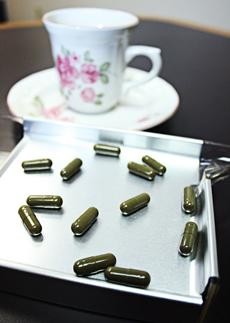Before now, the human papillomavirus vaccine, Gardasil, was thought to be the only protection against cervical cancer, but the Arizona Cancer Center is investigating the effects of a green tea extract on cervical cancer prevention.
The study is testing Polyphenon E, a green tea extract, on women who have previously tested positive for the human papillomavirus (HPV).
This extract is enriched with catechins, a chemical in plants that is considered a powerful antioxidant with multiple beneficial effects that may lead to cancer prevention, according to Dr. Francisco Garcia, professor of obstetrics and gynecology at the UA College of Medicine.
There were about 11,070 women diagnosed with cervical cancer in the United States in 2008, according to the American Cancer Society.
“”Approximately 20 million Americans are currently infected with HPV,”” said Faye Libbey, a nurse practitioner in the Women’s Health Clinic at Campus Health Service. “”There are over 100 strains of HPV, 13 of them having the potential to cause cervical cancer.””
According to Libbey, up to 25 percent of patients at the Women’s Health Clinic have abnormal pap tests indicating an HPV infection.
“”I like students to know that something can happen,”” said Libbey. “”The virus is extremely common; before it turns into cervical cancer we are able treat it and prevent it from progressing. With this study, they found a way to enhance the immune system with the components and antioxidants in green tea, helping women clear HPV faster. We are already telling patients who have HPV to drink two glasses of green tea per day.””
According to Garcia, who is also the chief investigator for the study, eligible participants will take four study capsules of Polyphenon E every morning for four months. The pill is equal to about 16 glasses of green tea per day.
The participants will make monthly clinic visits, to check and see if the virus is still there. At the end of the four months, there will be a biopsy of the cervix to determine the results.
“”Green tea has long been used in human studies, including lung cancer,”” said Garcia. “”We know it’s a safe trial that people can benefit from. We need other options for women to help prevent cervical cancer.””
According to Garcia, about 80-90 percent of women end up clearing HPV on their own. The trial offers an option for those whose immune systems cannot get rid of it on their own, helping speed up the clearing process and preventing it from reaching an at-risk stage for cancer.
“”The immune system in general is our treatment for HPV,”” said Libbey. “”Anything we can do to scientifically show that something will help clear it faster, then great. The emotional toll is really high when someone gets an abnormal pap.””
Eligible students are encouraged to participate in the trial.
“”Young women need options; this study provides an easier and safer alternative to surgery,”” Garcia said. “”We are always happy to get more people involved, we need all the help we can get.””









